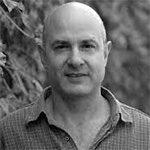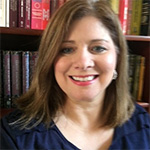in his shadow book
The Traveler and His Shadow
Franco Vaccarini
My father made only one great journey in his life, when it was his turn to perform military service in Río Gallegos, in the extreme south of Patagonia. He saw snow and boats for the first time, and when he returned to the land that my grandfather leased in Lincoln, to the west of Buenos Aires, in the flat heart of the humid pampas, he barely moved again. He always said, “I like to travel, but at night, I want to sleep in my own bed.” A horseman, he learned to drive when he was 51 and never went more than 60 kilometers per hour. Traveling by bus made his head spin, and don’t even think about putting him on a boat. Boarding a plane? Over his dead body. This is why he never understood my obsession with learning to parachute at the Club Escuela in the city of La Plata. What kind of unhinged kid would decide to launch himself into the void from a height of 1,000 meters? I always wanted to be different from my father, to hide how similar we were. I thought parachuting would give me ideas for my writing, but on the fourth jump, I realized it was better to keep going in the writing workshop that I had begun—and left —with the writer José “Pepe” Murillo.
That decision to start understanding how a narrative structure could be built ended up delineating the map of my life. Through the books I published for young readers, I started to travel regularly. My first story for children is about the land of my childhood, about the transformation that the ranches where people used to live suffered when they were abandoned and became shacks: abandoned houses where the ghost of a former resident usually dwelled. Stories of spells, of kids who became bored, who longed to leave soon for the city. Because at first, my imagination’s journey was short: I returned to the countryside of my childhood. By piling up readings—of other times, other traditions—I came to understand a key concept: Everything belongs to us. A reader’s domain is the Universe. My imaginary trips could take me to 19th-century London. To a town in the French countryside, to made-up places; to Titan, in the vicinity of Saturn.
A character from “The Mysterious Stranger,” a short story by Mark Twain, called himself the traveler. He lived in a medieval village in the center of Austria, and in his entire life, he had visited Venice once. With the perspective afforded by the passing of time, the “traveler’s” boasting endears him to us, but it made me think about the time when traveling meant going to the next town. Now we are in a traveler’s bulimia, in the age of global tourism when nothing is enough: we travel the world, and, suddenly, if a pandemic slips up on us, we realize how far we are from home. The distances are the same, the means of transportation work magic: we fly sheathed in exoskeletons made of steel over the oceans. Not to mention the millionaires who fly to space and who, within a few centuries, will provoke the same feelings as Mark Twain’s character. Braggarts with money who paid dearly for their few minutes in space.
The world is open, but it can be closed on a whim. Countries exchange passengers with each other until something unexpected happens, and it’s everyone back home, hopefully, or, perhaps, stranded a while in cold airports. A war, a virus. I have news: there is a world that never closes. A world that contains all possible variations of worlds. You know what I’m talking about. Books, our time machine, the place where we talk with the dead and become close confidants of Kafka. Or of Roald Dahl, Balzac, Tolstoy.
My first writers’ workshop was in the writer José “Pepe” Murillo’s home in the early 1980s. He was a recognized, award-winning author, especially in the genres of children’s and young adult literature. We read Borges’s short stories or poems by Elvio Romero, the great poet of Paraguay. Being in front of a writer greatly impressed me, but that didn’t keep me from typing texts on the typewriter that were destined to be forgotten but are the essential exercises every writer-in-training completes. No one is born knowing. I felt, with unchangeable conviction, that building narrative structures was in my future. It was impossible not to be a writer, and it seemed impossible to become one. But I didn’t have a Plan B. I had to persist.
In 1990, I published a book of about 30 short stories. The longest one, which was the title story, “Don’t Be Afraid When the Visitor Says Hello” (“No temas cuando la visita te salude”), was, without my realizing it, a text for children. Years later, I started to publish short stories in magazines like Billiken or the children’s magazine of La Nación newspaper (La Nación de los Chicos). Traditional publishing houses were putting together specific collections, while others dedicated only to the children’s and young adult audiences were emerging. A new voice, an authentic one, emerged in “Longing to Be Afraid” (“Ganas de tener miedo”) in 1998, my first story for young readers. As if I had cast aside a tradition that weighed me down, a false idea of what being a writer meant, something that seemed to come from outside me and not from what I was. The joy of adventure, of imagination, applied to my personal memory and to the readings I had built up. I learned the mechanisms that lead us to put those images into words like a painter uses a color palette.
When my life as a writer got on track, invitations started arriving. For festivals, for schools in small towns, supported by the town council or by a foundation. Publishing houses that covered the costs and took me from one city to another. One of them invited me to Asunción, my first international trip. Little by little, I started becoming aware of the privileges of my humble trade; I got to know all the provinces of the immense territories of Argentina. From Misiones, Formosa, and Jujuy at one extreme to Ushuaia at the other. Dozens of cities, towns, and some rural schools. From a five-star hotel in Mar del Plata, with a view of the beach in winter, to a terribly sad roadside hostel in the outskirts of a town that couples used for secret trysts. In general, worthy accommodations.
Writers travel after the book. They travel after readers meet them through their stories. Then genuine interest and expectations develop in anticipation of the coming visit.
Most of my stories have arisen from travel, with an irresistible force. New impressions, a different landscape, the locals’ accent, the stimulation of a setting that is both unknown and familiar, because books are the watchword of readers’ universal logic. Ideas and travels are carried forth by wonders.
In Huanguelén, people tell me a fantastic story, and a year later, I write a novel. In Santiago del Estero, on a sweltering afternoon, they show me their landmarks. A little later, I write a novel.
I arrive in La Rioja at two in the morning. The bus terminal looks haunted in the fog. I’m surrounded by silence, by shadows. The taxi driver who takes me to the hotel explains that it isn’t fog: it’s dust. He laughs at my suggestion and elucidates, “This isn’t London.”
A language professor waits for me at a bus stop on the route in Tanti, a province of Córdoba. We go to her house, located in a magical mountain forest where clear water runs down the peaks. Cold water, colorful stones: mica, feldspar, quartz. She takes care of a house that looks like it belonged to a holy man. Another story is born.
And the boys and girls who ask, “When you write, do you choose the words?”
Why should we read books if what they tell about are things that didn’t happen?
What part of the house do you write in? How do your stories come to you? Did your family support you? How long are you going to keep writing? Did the things you write about really happen? Did you ever see a ghost? What’s your name?
When a boy, in his naivety, asked me if I dreamed of winning the Nobel Prize, I didn’t answer cynically. I simply told him, with respect for his innocence, that I dreamed the dreams that don’t rely on others to make them come true. But since it isn’t all about awards, one boy on his school playground said:
“Author! Could you tie my shoes?”
And yes, I tied his shoes.
Before or after, I’ll tell them why I like to read, why I write, and how these two actions—reading and writing—produce an unlimited alchemy in time. We can’t see the plant moving while it grows, but it grows.
A piece of a strap—made into a sculpture—in the old train station in Alejo Ledesma, in the province of Córdoba. The fragment of a meteorite picked up in Campo del Cielo, on the border of the Gran Chaco and Santiago del Estero. A painting by Gabriel Jesús Díaz, a young painter from Uquía, in Jujuy, a town nestled in Quebrada de Humahuaca. Letters. A breakfast tray.
Inversely to my father, I finally became a traveling writer, and although I love to sleep in my own bed, I also like missing it. Too much placidity subverts inspiration.
Translated by Karen Wooley Martin



